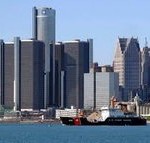 Over the years I’ve worked in many industries and occupied many roles, technical and not, and in my opinion one of the most under-appreciated jobs in corporations today is the CIO’s job. The CIO holds the delicate responsibility of making technology, business, and process work harmoniously together. Yet each of these three key areas tends to pull in its own direction and often conflict with one or both of the other two. Of course, the human factor tends to make things even more complicated by trying to play politics, or pull rank, or favor a certain area over the others. Yet the poor CIO is faced with striking a balance between the three.
Over the years I’ve worked in many industries and occupied many roles, technical and not, and in my opinion one of the most under-appreciated jobs in corporations today is the CIO’s job. The CIO holds the delicate responsibility of making technology, business, and process work harmoniously together. Yet each of these three key areas tends to pull in its own direction and often conflict with one or both of the other two. Of course, the human factor tends to make things even more complicated by trying to play politics, or pull rank, or favor a certain area over the others. Yet the poor CIO is faced with striking a balance between the three.
The greatest corporate rivalry I’ve seen is between the engineering/manufacturing department and the IT department. Engineering and manufacturing departments accuse IT of not knowing what they’re doing, and IT disregards engineers for not knowing what they are asking of IT. The fact of the matter is that engineers are simply trying to get their job done by requesting tools that will make them more efficient and IT is trying to make sure that the tools requested will function well with all other tools, policies, and procedures within the organization. It’s left to the CIO to referee. I don’t envy him. Tom Davenport, a Professor of Management and IT at Babson College in Wellesley, MA, says, “I hardly get anybody ever who wants to be a CIO, which is probably indicative of something. And if they do want to be a CIO, it’s like: ‘Fine, it’d be useful to rotate through this for a while on my path toward CEO.’ I think people respect technology, but there aren’t that many people anymore who want to be career CIOs.”
CIOs know all too well the adage that trying to please everyone pleases no one. Although I believe they’re habitually perceived disappointingly, that doesn’t necessarily mean they aren’t doing a good job. If the CIO is doing what he is supposed to do, then no one in any one department will receive 100% of their requests, which leaves a wake of unhappy campers eager for a scapegoat.
The role of CIO is changing in ways that are more evolutionary than revolutionary. Today, more than ever, your CIO’s hands are tied by things that keep him or her up at night and an ever-growing laundry list of “to-do”s. In addition to the conventional technical functions like security, software, hardware, and everything in between, your CIO also has superfluous responsibilities that include marketing and social media, which definitely demands their attention.
And this is just one of many “new” or untraditional CIO responsibilities. Today’s CIOs are expected to become the change-agents of the organization. It’s on their shoulders to implement new changes in the face of rapidly transforming mediums and technologies, which could satiate a forty-hour work week alone.
So let’s all make sure to think before answering the question, “Is your CIO doing a good job?” Also, the next time you see your CIO in the hallway or next to the coffee machine, let him or her know how much you appreciate their efforts and perseverance.







